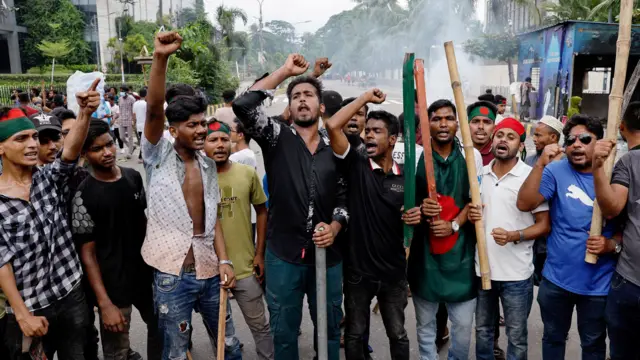Sheikh Mohammed bin Zayed Al Nahyan, the ruler of Abu Dhabi and leader of the United Arab Emirates, has pardoned 57 Bangladeshi nationals convicted for their involvement in protests related to unrest in their home country.
The decision comes after a telephone conversation last week between Sheikh Mohammed and Bangladesh’s interim prime minister, Nobel laureate Muhammad Yunus.

The pardons highlight the UAE’s strict laws concerning public demonstrations and free speech, which led to the rapid trials and convictions of the Bangladeshi protesters in July.
The state-run WAM news agency reported that the pardon includes canceling the sentences of those convicted and arranging for their deportation.
According to the Bangladesh Sangbad Sangstha news agency, all 57 Bangladeshis arrested and tried will soon return to their home country. The convictions, handed down by the Abu Dhabi Federal Court of Appeal, included 10-year prison sentences for 53 Bangladeshi nationals, an 11-year term for another, and life sentences for three others.
Prosecutors had accused the men of gathering in public to protest against their home government with intent to incite unrest, obstructing law enforcement, causing harm to others, and damaging property. However, Human Rights Watch described the men as “arbitrarily detained, convicted and sentenced to long prison terms … based on their participation in peaceful demonstrations.”

The protests in the UAE were triggered by weeks of demonstrations in Bangladesh over a controversial quota system that reserved up to 30% of government jobs for relatives of veterans from the 1971 war of independence.
The unrest in Bangladesh escalated, leading to the resignation and flight of longtime Prime Minister Sheikh Hasina on August 5, after weeks of violent protests and government crackdowns that reportedly resulted in over 600 deaths, according to United Nations estimates.
The UAE’s decision to pardon the protesters underscores the delicate balance the country must maintain as a nation where expatriates make up about 90% of the population.
With more than 9.2 million residents, only 10% are Emirati citizens. Bangladeshis represent the third-largest expatriate community in the UAE, following Indians and Pakistanis.
The pardons also draw attention to the UAE’s stringent laws that tightly restrict speech and criminalize public protests. Nearly all major local media in the country are either state-owned or state-affiliated, and the few protests by foreign laborers that do occur are typically met with swift legal action.
This incident serves as a reminder of the complex relationship between the UAE and its large expatriate workforce, as well as the challenges faced by migrant workers in navigating the legal and cultural landscape of their host country.
As the pardoned Bangladeshis prepare to return home, the international community continues to monitor the human rights situation in both the UAE and Bangladesh.



